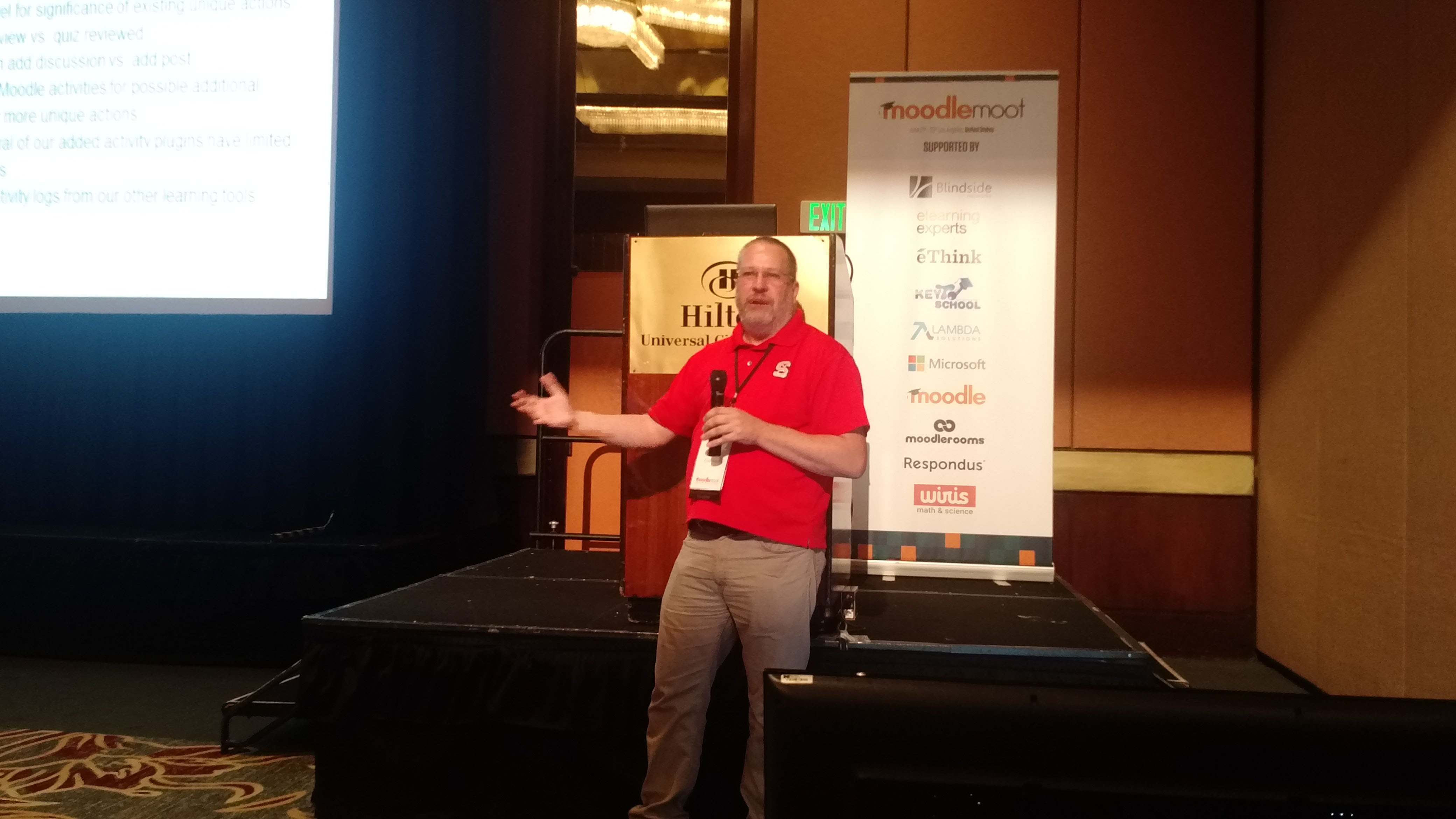Moodle Moot 2016 Recap

Contributions by Stephen Bader, Martin Dulberg, Marc Gracieux, Lou Harrison, Charlene Pettiway, Scott Watkins and Jeff Webster
Seven DELTA staff had the opportunity to go to the Moodle Moot (a Moodle Users conference) in Los Angeles, California, June 21-23, 2016. We went to the Moot to engage in several different activities:
- Learn more about Moodle and future directions of the software
- See what innovative things people were doing with Moodle that we can incorporate at NC State
- Present some of the novel things we are doing and working on
- Network with other professionals and discuss some of the solutions to challenges we all face in providing enterprise-level technology solutions
- Attend planning meetings and influence the direction of future Moodle development
We were successful on all counts!
We had five presentations and a poster that were all well received:
- The Faces Behind Moodle at NC State: A Look at the Personnel Supporting Self-Hosted Moodle
- Behat for Beginners from a Beginner
- Managing the Moodle Configuration on Multiple Instances
- Making the Learning Analytics Processor (LAP) better, stronger, faster and more Moodle-friendly
- Learning Technology Governance at NC State, How Decisions are Made with Stakeholder Involvement
- WolfWare — Helping Manage/Access Courses with Multiple Moodle Instances (Poster)
For our staff who were going to a Moot for the first time, it was a great chance to learn some new techniques, new ideas for using Moodle and new ways to handle their job responsibilities. For those of us who have previously attended, it was a chance to catch up, find out about the future direction of Moodle and network with some of the staff at Moodle HQ as well as other skilled practitioners. We all took the time to compare notes with others in the Moodle community to further our knowledge and that of our colleagues.
We have notes for specific sessions attended, feel free to peruse.
Some comments from our attendees detailing a few takeaways they got from the conference:
I was pleased to see a presentation on the integration of gApps and Moodle. I think they are on the right track now and Steve has already joined their group to see what’s going on. They have a good approach to document sharing to a course but still have some issues to work out over ownership of docs. They’re also interested in two-way sync to gCal and migrating Moodle groups to permissions groups in Google. I think we can learn from them and use the gApps API tools they use for our Moodle needs and also other uses (like making sure gDocs are still available to DELTA after someone leaves who owns them).
I also attended the annual meeting of the Moodle Users Association, MUA (we’re a silver member). It was the first f2f meeting they had, and it’s a fledgling group, so it’s going to take time to get organized, but they’re already earmarking funds (from membership) to support specific Moodle development by Moodle HQ. There are a lot of exciting possibilities, including teaming up with other MUA members to fund expedited development projects we’re interested in promoting.
And, whatever you do, don’t eat the Spicy Fire Chicken Skewer at Dan Sung Sa!
Collaboration
While NC State/DELTA has become much more active in the last year in the Moodle community we need to be doing more. There are a lot of large efforts we should be involved at least in the conversation, if not coding; Gradebook, accessibility, Google integration. Then there are areas where we could share experience and/or code with common environments; multi-instance setups, database tuning. And specifically, I think we could work with University of Minnesota more as I discovered we have even greater similarities; multi-instance setup, gateway kiosk vs. WolfWare, PeopleSoft student with data feeds and grade submit, Google Apps for Education campus, etc.
Moodle User Tours
This seems like a really great way to build training/tutorials into Moodle. This is a local plugin now but should be core in 3.2. I like that you can create your own tours or use/adapt tours others have created because tours can be exported a JSON files. I really like that the user has the option of resetting the tour on a page so they can easily replay if needed.
Learning As Becoming
One of the takeaways for me was during Martin Dougiamas’ keynote. Dougiamas encouraged us to think about learning as a process of becoming. I think Dougiamas was acknowledging the relationship between learning and identity. Through this type of understanding, we can begin to think about how to craft environments (i.e. within Moodle) that give rise to the process of becoming. And work to find and use appropriate tools to provide these types of active participatory experiences. This, I noticed, was the tone for many of the instructional design sessions that I attended while at Moodle Moot this year. And I found it quite enjoyable to attend each of the presentations and connect with individuals working to create these types of learning environments within their respective communities.
Attending the 2016 MoodleMoot conference for the first time was a valuable and great experience. I had the opportunity to become a part of a dynamic Moodle community. Engaging and networking with fellow “Moodlers” both in academic and non-academic fields allowed me to exchange ideas, best practices and knowledge with people of different perspectives and approaches. One conversation that stood out was with a person using Moodle to develop resources for fire departments across the nation to train them in identifying hazardous materials. I had discussions about how the various conference sessions helped with generating new ideas and how to implement them in our own work. Throughout the conference, I even found myself back in work mode listening and asking questions in hope to offer my own support and feedback to others regarding Moodle. Overall, I enjoyed the conference, I left with a better perspective of Moodle and I hope that what I learned and experienced will reflect back into my work at NC State to support faculty and staff more effectively.
Gradebook Versatility in Moodle 3.0 (Nicholas Bongers, Oakland University )
“Yes, the Gradebook can Do [and look] Crazy” the presenter stated at the beginning of this session. As someone who supports faculty using Moodle, I’ll admit the Gradebook can be intimidating and the most challenging to implement in a Moodle course. But from this session, I learned practical strategies to help faculty overcome their Gradebook challenges, how to explain **why** a better way is valid over other ways to set up the Gradebook and key features that faculty may not be aware of in the Gradebook to help facilitate a better experience using the Gradebook. Here are a few highlights from the presentation:
Why use the Gradebook?
- Students appreciate and want to see their grades.
- It’s a space to give consistent feedback to students.
- It’s versatile, flexible and it can accommodate most grading schemes.
Did you know the Gradebook can…?
- Drop the lowest grade(s) in a category.
- Natural Aggregation — will simply add up the points.
- User Report a.k.a “what the students see” — you can change the display settings to create a clean and less confusing Gradebook view for student by showing/hiding particular columns (average, weightings, contribution to course total, etc.).
- Exclude Empty grades — students benefit from seeing a running total of how they are doing in the class, things in the future (empty grades) will not negatively affect their course total. Note: you must manually enter “0” for things a student failed or did not complete for it to negatively affect their grade (see next point!).
- Single View — easy way to bulk insert 0’s for empty grades or any grade for all students, input or view grades for one assignment or student…all on one page.
- Quick access to Gradebook setup — go straight to “Gradebook Setup” from the course main page by selecting the link in the Administration Block.


